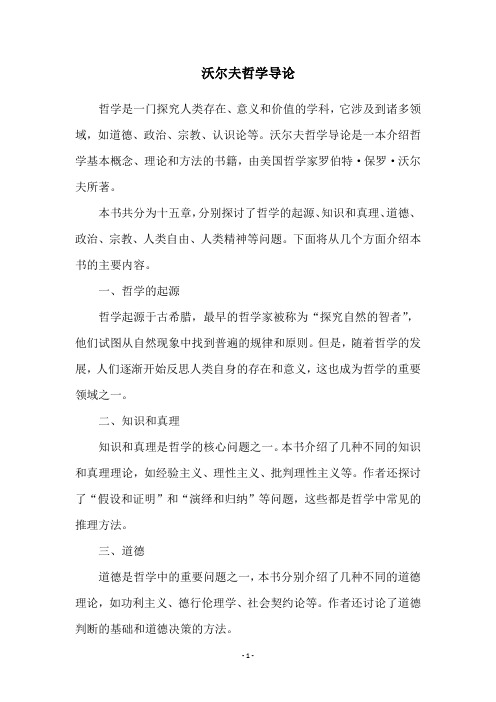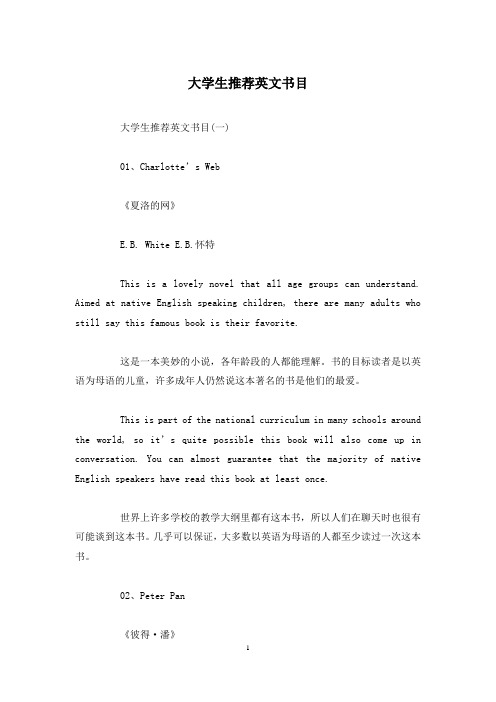谁来讲讲托马斯沃尔夫 Thomas Wolfe
托马斯人物全介绍(彩色)

主线火车托马斯(Thomas)T-1号托马斯是个不知天高地厚、性格急躁的小火车头。
他常常做一些力所不逮的事,弄得自己伤痕累累。
不过伤心过后,托马斯很快又会欢快的奔走在调车场和他的专线上,托马斯对于拥有自己名字的铁路专线很是自豪。
(托马斯的原型是基于行走在伦敦南部海岸铁路线上的0-6-0 E2 型蒸汽机车)艾德华(Edward)T-2号艾德华是胖总管辖下铁路资历比较老的火车头。
艾德华最大优点就是他的亲善力。
每当其他火车头做了错事,胖总管总是让艾德华去安慰大家并重整旗鼓。
一开始艾德华身上并没有数字标记。
他现在广为人知的“第2本”头衔是在“铁路系列”的第六故事书里加进去的。
亨利(Henry)T-3号亨利是一个长长的,速度很快的火车头。
他有高贵的外表,而且像所有出身高贵的人一样,他非常敏感,很容易生病。
但是现在他以崭新的姿态复出。
可怜地是,他会为了钱给其他火车头卖命。
在他改变形状之前,他必须添加一些特殊的煤炭作为燃料,这样才能跑起来。
高登(Gordon)T-4号高登是蒸汽机车家族中的高端人才。
他是胖总管车队里速度最快,动力最强的火车头。
高登很清楚他的优势,但他很善良,有一颗宽容的心,并且随时愿意用他的超能量去帮助其他小的火车头解决困难。
詹姆士(James)T-5号詹姆士是一个中等型号的火车头。
他的6个驱动轮既没有高登的大也没有托马斯的小。
他有鲜红美丽的外衣和黄铜穹顶,常常感觉自己是个很耀目的火车头。
这种想法偶尔会让他对自己的工作产生不切实际的幻想,而这毫无疑问会给他带来麻烦。
詹姆士是复合式火车头,客运和运货车厢他都能拉动。
培西(Percy)T-6号培西是火车头主力队伍里的新丁。
他是个快乐的小家伙,很安于现状。
他只要在调车场里快乐地跑几圈就很满足了,不像其它同伴那样想着要去外面的世界探险。
培西的原型是Avonside Engine Company的0-4-0型号蒸汽机车。
托比(Toby)T-7号托比无论是外表还是对事情的观点都是很传统的。
沃尔夫哲学导论

沃尔夫哲学导论哲学是一门探究人类存在、意义和价值的学科,它涉及到诸多领域,如道德、政治、宗教、认识论等。
沃尔夫哲学导论是一本介绍哲学基本概念、理论和方法的书籍,由美国哲学家罗伯特·保罗·沃尔夫所著。
本书共分为十五章,分别探讨了哲学的起源、知识和真理、道德、政治、宗教、人类自由、人类精神等问题。
下面将从几个方面介绍本书的主要内容。
一、哲学的起源哲学起源于古希腊,最早的哲学家被称为“探究自然的智者”,他们试图从自然现象中找到普遍的规律和原则。
但是,随着哲学的发展,人们逐渐开始反思人类自身的存在和意义,这也成为哲学的重要领域之一。
二、知识和真理知识和真理是哲学的核心问题之一。
本书介绍了几种不同的知识和真理理论,如经验主义、理性主义、批判理性主义等。
作者还探讨了“假设和证明”和“演绎和归纳”等问题,这些都是哲学中常见的推理方法。
三、道德道德是哲学中的重要问题之一,本书分别介绍了几种不同的道德理论,如功利主义、德行伦理学、社会契约论等。
作者还讨论了道德判断的基础和道德决策的方法。
四、政治政治是哲学中的另一个重要领域,本书介绍了几种不同的政治理论,如自由主义、社会主义、保守主义等。
作者还探讨了政治权力的来源和分配、政治正义的概念等问题。
五、宗教宗教是哲学中的另一个重要领域,本书介绍了几种不同的宗教哲学,如神学、自然神论、宗教存在主义等。
作者还探讨了宗教和道德、宗教和科学等问题。
六、人类自由人类自由是哲学中的一个重要概念,本书介绍了自由的不同形式和自由的限制。
作者还探讨了自由和责任、自由和平等问题。
七、人类精神人类精神是哲学中的另一个重要概念,本书介绍了人类精神的不同形式和发展历程。
作者还探讨了人类精神和文化、人类精神和社会等问题。
总之,沃尔夫哲学导论是一本介绍哲学基本概念、理论和方法的书籍,它涵盖了哲学的各个领域,对于初学哲学的读者来说是一本很好的入门读物。
本书不仅介绍了哲学的基本概念和理论,还探讨了哲学和现实生活的联系,让读者更好地理解哲学的价值和意义。
大学生推荐英文书目

大学生推荐英文书目大学生推荐英文书目(一)01、Charlotte’s Web《夏洛的网》E.B. White E.B.怀特This is a lovely novel that all age groups can understand. Aimed at native English speaking children, there are many adults who still say this famous book is their favorite.这是一本美妙的小说,各年龄段的人都能理解。
书的目标读者是以英语为母语的儿童,许多成年人仍然说这本著名的书是他们的最爱。
This is part of the national curriculum in many schools around the world, so it’s quite possible this book will also come up in conversation. You can almost guarantee that the majority of native English speakers have read this book at least once.世界上许多学校的教学大纲里都有这本书,所以人们在聊天时也很有可能谈到这本书。
几乎可以保证,大多数以英语为母语的人都至少读过一次这本书。
02、Peter Pan《彼得·潘》J.M. Barrie 詹姆斯·马修·巴利Almost everyone knows the story of “Peter Pan” which is why this is an easy read. Being familiar with a story already helps the reader to understand the text better.几乎所有人都知道彼得·潘的故事,这就是为什么称它为简单读物的原因。
wolf定律的意义

wolf定律的意义沃尔夫定律,又称沃尔夫-埃宾豪斯定律,是由德国生理学家沃尔夫和数学家埃宾豪斯于20世纪初共同发现的。
该定律主要研究生物力学领域,旨在探讨生物组织在外力作用下的变形和力的关系。
如今,沃尔夫定律已广泛应用于生物力学、材料科学、康复医学等多个领域,为科学研究和工程技术提供了有力的理论支持。
一、沃尔夫定律简介沃尔夫定律的核心内容是:在一定的范围内,生物组织的应力与应变呈线性关系。
这意味着,当外力作用于生物组织时,组织的形变与受力大小成正比。
这一定律为生物力学研究提供了一个基本框架,有助于我们更好地理解生物组织的力学性能。
二、沃尔夫定律的应用领域1.生物力学:沃尔夫定律在生物力学领域具有广泛的应用,如研究骨骼、肌肉、关节等组织的力学性能,有助于提高医疗康复效果和预防运动损伤。
2.材料科学:沃尔夫定律可用于研究生物材料的力学性能,如弹性模量、韧性等,为生物材料的设计和制备提供理论依据。
3.康复医学:沃尔夫定律在康复医学领域具有重要意义,通过对患者生物组织的应力-应变关系进行检测,可评估康复治疗的效果,为临床治疗提供科学依据。
4.工程领域:沃尔夫定律在工程领域也有广泛应用,如研究生物组织的力学性能,为生物医学工程、生物力学传感器等领域的创新发展提供理论支持。
三、沃尔夫定律在我国的研究与发展我国对沃尔夫定律的研究始于20世纪50年代,经过几十年的发展,已在生物力学、康复医学等领域取得了显著成果。
近年来,我国学者在沃尔夫定律的基础上,提出了许多新的理论和方法,如有限元分析、神经网络模型等,进一步丰富了生物力学的研究体系。
四、沃尔夫定律对个人成长的启示沃尔夫定律告诉我们,生物组织在一定范围内的应力与应变呈线性关系。
同样,在个人成长过程中,我们也需要学会适应和调整,使自己的能力与所面临的挑战相适应。
在面对困难时,我们要保持积极的心态,勇敢迎接挑战,通过不断努力和积累,使自己的能力得到提升。
五、总结沃尔夫定律作为一个重要的生物力学理论,为我们研究生物组织的力学性能提供了有力的支持。
大学英语综合教程1课文翻译-大学英语fame课文翻译大学

大学英语综合教程1课文翻译|大学英语fame课文翻译大学学习大学英语,经常会遇到课文翻译的题目,你知道大学英语fame课文怎么翻译吗?以下是小编整理的大学英语fame课文翻译,欢迎阅读。
【大学英语fame课文】Fame is very much like an animal chasing its own tail who, when he captures it, does not know what else to do but to continue chasing it. Fame and the exhilarating celebrity that accompanies it, force the famous person to participate in his or her own destruction. Ironic isn9;t it?Those who gain fame most often gain it as a result of possessing a single talent or skill: singing, dancing, painting, or writing, etc. The successful performer develops a style that is marketed aggressively and gains some popularity, and it is this popularity that usually convinces the performer to continue performing in the same style, since that is what the public seems to want and to enjow. But in time, the performer becomes bored singing the same songs in the same way year after year, or the painter becomes bored painting similar scenes or portraite, or the actor is tired of playing the same character repeatedly. The demand of the public holds the artist hostage to his or her own success, fame. If the artist attempts to change his or her style of writing or dancing or singing, etc.,the audience may turn away and look to confer fleeting fickle fame on another and then, in time, on another , and so on and so on.Who cannot recognize a Tennessee Williams play or a novel by John Updike or Ernest Hemingway or a poem by Robert Frost or W. H. Auden or T. S. Eliot? The same is true of painters like Monet, Renoir, Dali or Picasso and it is true of movie makers like Hitchcock, Fellini, Spielberg, Chen Kai-ge or Zhang Yimou. Their distinctive styles marked a significant change in the traditional forms and granted them fame and forturn, but they were not free to develop other styles or forms because their audience demanded of each of them what they originally presented. Hemingway cannot even now be confused with Henry James or anyone else, nor can Forst be confused with Yeats, etc. The unique forms each of them created, created them. No artist or performer can entirely escape the lure of fame and its promise of endless admiration and respect, but there is a heavy price one must pay for it.Fame brings celebrity and high regard from adoring and loyal fans in each field of endeavor and it is heady stuff. A performer can easily come to believe that he or she is as good as his or her press. But most people, most artists do not gain fame and fortune. What about those performers who fail, or anyone who fails? Curiously enough, failure often serves as its own reward for many people! It brings sympathy from others who are delighted not to be you, and it allows family and friends to lowertheir expectation of you so that you need not compete with those who have more talent and who secceed. And they find excuses and explanations for your inability to succeed and become famous: you are too sensitive, you are not interested in money, you are not interested in the power that fame brings and you are not interested in the loss of privacy it demands, etc. ---all excuses, but comforting to those who fail and those who pretend not to notice the failure.History has amply proven that some failure for some people at certain times in their lives does indeed motivate them to strive even harder to succeed and to continue believing in themselves. Thomas Wolfe, the American novelist, had his first novel Look Homeward, Anger rejected 39 times before it was finally published and launched his career and created his fame. Beethoven overcame his tyrannical father and grudging acceptance as a musician to become the greatest, most famous musician in the world, and Pestalozzi, the famous Italian educator in the 19th century, failed at every job he ever had until he came upon the idea of teaching children and developing the fundamental theories to produce a new form of education. Thomas Edison was thrown out of school in fourth grade, at about age 10, because he seemed to the teacher to be quite dull and unruly. Many other cases may be found of people who failed and used the failure to motivate them to achieve, to succeed, and to become famous. But, unfortunately, for most people failure is the end oftheir struggle, not the beginning. There are few, if any, famous failures.Well then, why does anyone want fame? Do you? Do you want to be known to many people and admired by them? Do you want the money that usually comes with fame? Do you want the media to notice everything you do or say both in public and in private? Do you want them hounding you, questioning you and trying to undo you? In American politics it is very obvious that to be famous is to be the target of everyone who disagrees with you as well as of the media. Fame turns all the lights on and while it gives power and prestige, it takes the you out of you: you must be what the public thinks you are, not what you really are or could be. The politician, like the performer, must please his or her audiences and that often means saying things he does not mean or does not believe in fully. No wonder so few people trust politicians. But we have not answered the question at the beginning of this paragraph: why does anyone want fame? Several reasons come to mind: to demonstrate excellence in some field; to gain the admiration and love of many others; to be the one everyone talks about; to show family and friends you are more than they thought you were. Probably you can list some other reasons, but I think are reasonably common.I say to those who desperately seek fame and fortune,celebrity:good luck. But what will you do when you have caught your tail,your success,and your fame?Keep chasing it?If you do catch it,hangon for dear life because falling is not as painful as landing. See you soon famous and almost famous.【翻译】名声就像一只追逐自己尾巴的动物,当它抓住它的时候,它不知道还能做什么,只能继续追逐它。
人类语言学家沃尔夫的遗产--读《论语言、思维和现实》

人类语言学家沃尔夫的遗产--读《论语言、思维和现实》
作者:姚小平
作者单位:北京外国语大学
刊名:
外语教学与研究
英文刊名:FOREIGN LANGUAGE TEACHING AND RESEARCH
年,卷(期):2002,34(1)
被引用次数:10次
引证文献(11条)
1.曾玲语言与思维:绝对还是相对[期刊论文]-现代交际 2011(6)
2.鲍文萨丕尔——沃尔夫假说的思想内涵及其现实意义[期刊论文]-兰州学刊 2010(10)
3.莫琼"萨丕尔-沃尔夫假说"解析[期刊论文]-湖北广播电视大学学报 2010(8)
4.姚喜明.王惠敏论肯尼斯·伯克语言观中的术语视界[期刊论文]-上海大学学报(社会科学版) 2009(6)
5.张俊钰认知科学、语言与思维研究的结论与启示[期刊论文]-学理论 2009(11)
6.邱立中论语言与思维关系研究的视觉与手段[期刊论文]-沈阳农业大学学报(社会科学版) 2009(2)
7.郑冰梅.郭爱萍"沃尔夫假说"实质之探讨[期刊论文]-太原理工大学学报(社会科学版) 2007(1)
8.郭爱萍.郑冰梅沃尔夫"语言相对论"内涵之辨析[期刊论文]-山东外语教学 2007(1)
9.邓宝石.杨波国外语言相对论研究刍议[期刊论文]-西南农业大学学报(社会科学版) 2005(4)
10.齐荣军思维和语言的关系新解[期刊论文]-山东教育学院学报 2005(2)
11.李会民.张明杰从语言结构看民族文化特征[期刊论文]-河南职业技术师范学院学报 2003(1)
本文链接:/Periodical_wyjxyyj200201012.aspx。
托马斯·沃尔夫经典语录

托马斯·沃尔夫《天使望故乡》赤裸裸地,我们独自来到这个孤独的世界。
在黑暗的娘胎里,我们无法了解母亲的面容;脱离母亲的肉体之后,我们来到了这个难以说清、无法互通的人间牢狱。
我们之中,有谁能真正了解他的兄弟?有谁曾经探察过他父亲的内心深处?有谁不是永远关闭在牢狱般的境遇中?又有谁不是永远地孤独、如同身处异乡的游子?哦,失落的荒废,这一切皆在燥热中迷茫,在昏暗的星光中变得暗淡,如梦如烟!在无言中,我们回记、寻找那伟大的、被遗忘的语言,寻找那通向天堂却又消失了的小路,还有那块石头,那片树叶,那一扇没有找到的门。
它们在哪里?什么时候才能找得到?毁灭人类的种子在沙漠上开出花来,救治人类心灵的仙草长在山间岩缝里,我们的生活因为一位从佐治亚州来的懒女人而饱受影响,只是因为伦敦的某小偷没有被绳之以法。
我们生活的每一刻都是四万年历史的浓缩。
在每个争分夺秒的日子里,我们都像苍蝇一样嗡嗡地叫着飞向死亡,每一刻都是通向历史的一扇窗户。
可是,他从来没有找到过心中追寻的天使,也从没有学会如何雕出天使的头像。
他学会了雕刻鸽子、小羊、死者交叉着的双手、精美漂亮的文字——可就是不会雕刻天使。
在多年荒废的精力与时光里——在巴尔的摩乱哄哄的岁月里,他工作过,烂醉过,在布斯与塞尔维尼剧院看过戏,这些戏对他产生了灾难性的影响,他一看戏就会激动不已。
他能回忆起那些激昂的演说词,然后在大街上快步疾走,喃喃自语,挥动着双臂——这些就是我们人生道路上盲目模仿,是画饼充饥的满足。
在无言的记忆中,我们追寻那被遗忘了的语言,追寻通向天堂之路的尽头,寻找那一块石头,那一片树叶,那一扇门。
可是它们在哪里呢?什么时候才能找得到?因为从一开始,他们两人之间就酝酿着某种难以说清、无休无止的战争。
这种战争比爱情更深、比仇恨更深,是一种深入到人性骨髓的东西。
这些年,伊丽莎在麻木中挺了过来。
多年的爱、恨、失落都在她的脸上留下了痛苦、骄傲与死亡的印痕。
在她与他完全不同、充满激情的生活中,她拼命挣扎着,尽管累弯了腰,但是她最终战胜了疾病,拖着瘦弱的躯体一路走来,而且变得越来越坚强。
托马斯约翰 沃森

成功秘诀
1、从小立志,不赚“有数的”工资。 2、善于推销产品,更精于推销自己。 3、用高薪换取属下的绝对顺从。 4、衣冠不能造就一个人,但在造就一个商人的过程中,衣冠却起着重要 的作用。 5、不要听到别人说“不”就放弃。 6、今天要努力干——非常努力地干!你的明天就不会有什么问题。你将来 的前程和金钱也不会有什么问题。 7、阅读——倾听——讨论——观察——思考。 参考资料 1 托马斯·约翰·沃森 .中国知网[引用日期2019-06-27]
托马斯 ·约 翰 ·沃森
IBM创始人
01 早年经历
03 IBM精神
目录
02 创立IBM 04 成功秘诀
托马斯·约翰·沃森(Thomas John Watson,1874年2月17日——1956年6月19日),国际商用机器公司 (IBM)创始人。 出生于美国纽约。毕业于美国埃尔米拉商业学校。1896年进入美国“全国收款机公司”担任 推销员,1914年进入计算制表记录公司(CTR)任公司经理。1924年改计算制表记录公司为IBM公司,成为IBM 的创始人。1956年去世。
IBM精神
尽管沃森离开了人世,但他所创立的IBM精神至今还在公司里发扬光大。
这种精神是他刚进当时的计算制表记录公司制订的,当时公司有1200名雇员,由于内部风气不良,员工之 间不团结,许多老工作人员更是喜欢欺压新来者。针对这一弊端,沃森提出三条要求:第一必须尊重每一个人; 第二必须为用户提供尽可能好的服务;第三必须创造最优秀、最出色的成绩。这些措施,极大地激励了全体员工 团结向上的积极性。
两个月后,沃森遇上了IBM前身的奠基者弗林特。弗林特是华尔街最红火的金融家,号称“信托大王”。他 对沃森的才干早有所闻,旋即聘任他为计算制表记录公司的经理。这家弗林特属下的公司,主要生产天平、磅秤、 计时钟和制表机等。由于前任在经营方面不得要领,成立不到三年已是负债累累、濒临破产。沃森之所以对这家 公司感兴趣,主要看中它的产品。他认为计时钟、制表机等都是办公自动化的工具,具有广阔的商业前景。
- 1、下载文档前请自行甄别文档内容的完整性,平台不提供额外的编辑、内容补充、找答案等附加服务。
- 2、"仅部分预览"的文档,不可在线预览部分如存在完整性等问题,可反馈申请退款(可完整预览的文档不适用该条件!)。
- 3、如文档侵犯您的权益,请联系客服反馈,我们会尽快为您处理(人工客服工作时间:9:00-18:30)。
谁来讲讲托马斯沃尔夫Thomas Wolfe
2007-06-25 17:06:50来自: Auguste(在这世间微茫的光线里咀嚼黑暗)
美国小说家托马斯沃尔夫(Thomas Wolfe,1900~1938)。
生于北卡罗来纳州的山区小城阿什维尔,父亲是雕凿墓碑的石匠,母亲当过图书推销员和教员。
父母一生生育了8个孩子,存活下来的有6个,他是最小的一个。
托马斯沃尔夫毕业于哈佛大学,拥有硕士学位。
他1938年9月因患脑炎死于马里兰州的巴尔的摩。
他虽然只活了38岁,却创作了4部长篇小说,分别是《天使,望故乡》、《时间和河流》、《蛛网与磐石》和《你不可能再回家》;还有数十篇中篇、短篇小说。
仅以这些作品,就奠定了他在美国文学史上与诺贝尔文学奖得主刘易斯、福克纳和海明威3位大师齐名的地位。
The American novelist Thomas wolff (Thomas Wolfe, 1900 ~ 1938). Born in the mountains of north Carolina town ASHLEY Wells, father is carved the tombstone masons, mother as a book salesman and faculty. The life birth parents of the eight children survive have six, he is the smallest one. Thomas wolff graduated from Harvard University with a master's degree. He in September 1938 for a encephalitis died in Baltimore, Maryland. Although he
only live for 38 years old, but wrote four novels, respectively is "angels, hope home", "time and river", "the web and rock" and "you can't go home again"; And dozens of article novellas, short stories. Only by these works, he laid him in the history of American literature and Nobel Prize winner lewis, Faulkner ?----------------
费里尼
费德里柯·费里尼(FedericoFellini),著名的意大利艺术电影家,1920年,费里尼出生在一个叫米尼的小镇。
小镇有着灰暗森严的冬天,保守的天主教氛围却激发了小费里尼无穷的想象空间。
这座亚德里亚海边的小镇成为了费里尼一生“演出”的原始场景,北方小海港的气息和疏懒随意的意大利性情弥散于他的全部作品之中,这个夏天里亮晃晃的阳光和冬天雾锁天空交织的城市给了他最多的创作灵感,而他在70年代更以《我的回忆》一片向故乡表示了深深的感念。
那部轻松怀旧的法西斯时代里米尼家庭生活肖像荣获了奥
斯卡最佳外语片奖。
ee Delhi ·ke FeiLiNi (FedericoFellini), the famous Italian art film, in 1920, FeiLiNi was born in a town called Minnie. The town has a
gloomy heavily fortified winter, the conservative Catholic atmosphere but inspired little FeiLiNi imagination space. The Delhi and the sea and small town in FeiLiNi life "performance" of the original scene, the north of small harbour breath and ShuLan optional Italian temperament embedded in the all of his work in progress, this summer LiangHuangHuang sunshine and winter fog lock interweave the sky city gave him the most creative inspiration, and he in the 70 s more in order to "my memories of a home to a deep Joe coughlin said. The department of the easy nostalgic fascist era rimini family life has won an Oscar for best foreign language film portrait ?。
